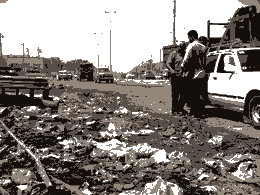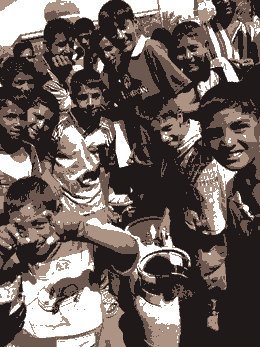 There are prisons not in darkness, nor built of bars. There are prisons not in darkness, nor built of bars.
There are prisons in our souls.
Darkness is over, but sorrow is overflowing:
an attitude controls
(everything everywhere)
and protects those who came –
it doesn't care about our patience...
Excerpt from the poem "Freedom's Panorama"
by Muthana Mudher Mohammed.
Everywhere in Iraq, you can see the destruction
from the US-UK invasions. Baghdad is a highly polluted city: hot
air mixed with dust from destroyed
buildings and auto pollution makes everyone very uncomfortable.
Half of the city's utilities, destroyed in the 1991 Gulf War and
never rebuilt because of sanctions, are now newly destroyed from
the U.S. invasion last March and never repaired. June to August
is the hottest period in Iraq, every day over 100 degrees of dry
heat. With no electricity to run air conditioning and no clean running
water, people feel as though they are living in hell. Respiratory
disease and heat stroke are very common, especially for the old
people and children,
and heat-related deaths have increased
at an alarmingly high rate.
 A
U.S. military-imposed curfew of 11:00 PM in Baghdad and many other
Iraqi cities; American Humvees and tanks
speeding across the city with machine guns and license to do whatever
they want; a country without
government; a people feeling without hope - this is the reality
of Iraq today. A
U.S. military-imposed curfew of 11:00 PM in Baghdad and many other
Iraqi cities; American Humvees and tanks
speeding across the city with machine guns and license to do whatever
they want; a country without
government; a people feeling without hope - this is the reality
of Iraq today.
Many Iraqis are angry that
while U.S. occupiers have the advanced technology to deploy their
missiles to hit the exact target, they cannot
fix the city's power lines. Three months, 100 days, after the U.S.
invasion, there is still almost no U.S.
public assistance for suffering Iraqis, and no rebuilding efforts
by U.S. administrators or military in Iraq.
With over 140,000 U.S. troops
(or what they call "coalition forces") in Iraq, the U.S.
military has overwhelming firepower, yet they are only concerned
with using them to hunt Saddam Hussein and his followers - what
they call "very bad people"- or protecting Iraqi oil industries.
They couldn't care less, however, about social crimes, and public
security on the street has completely deteriorated.
Human rights workers unofficially report that,
since the end of the "major combat" in May to July, up
to 2,000 people have been murdered in social crimes in Baghdad alone.
Since I returned from Iraq, at least three people who I met in Iraq
either directly or indirectly, have been killed. In some ways, the
streets of Baghdad remind me a lot of life in the "hoods"
of inner-city America.
|

